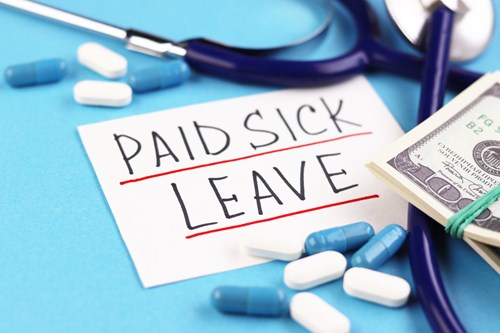Rethinking sick leave?
Paid sick leave is often seen as a benefit that companies offer, but in reality, it should be considered an employee right. In addition, isn’t it time to rethink what we consider sick leave and why it is important to do so? Gerhard Erasmus lifts the lid on this relatively unspoken area of employment.

As with most of my blog posts, this one is inspired by recent events and situations. There are three little stories, which led into three parts to address the situations that arise from the stories. But why do we need to talk about sick pay at all? After all, it is a relatively unspoken area of employment with little written on the topic. And let’s face it, for many teachers on zero hour contracts, they cannot afford to take sick leave because they do not get paid. And even for those who do get paid, someone who takes regular sick leave is often viewed as a problem – generally, without looking at the underlying reason for why that person might be taking sick leave frequently. Of course, there will always be the odd employee who abuses ‘the system,’ but it has to be said that the negative stigma attached to sick leave with comments like ‘They’re probably hungover’ or ‘I don’t think they are really sick’ really does very little to show trust in employees.
Before I go on, I should say that as a manager and company owner, I am very well aware of the cost of sick leave, and if employees get six days of paid undocumented sick leave a year, and you need to pay someone to cover for them when they are off, four employees basically add an additional month’s salary to your overheads. In other words, if one teacher phones in sick six days a year, and you need a cover teacher to teach those six days a year, you are, in effect, paying for twelve days within those six working days. Four of those adds twenty-four days that you are paying for additionally (basically, a month of working days), without generating income for the additional expense. I mention this because I will argue in this post that it is exactly what we should be doing, despite the cost.

Is paid sick leave a benefit to your organisation?
My first story starts back in early December, when there had been a bit of a flu outbreak in our area and one of our hourly paid (part-time) teachers, who has now moved on to a full-time contract at our school, phoned in sick. When we calculated his pay, he pointed out that we had made a mistake and we were paying him for 90 minutes more than he had worked. It is our company policy that if a part-time teacher has a regular class, they get paid if they phone in sick, so we had rightfully added the 90 minutes that he did not teach because it was a regularly scheduled class and a company policy.
So why do we have this policy? The first reason is that paid sick leave should be given to all employees simply because it should be a legal requirement. It isn’t always, but it should be. The reason I feel it should be, and also the main reason we have this policy, is that if an employee, teacher or not, has a family to support, they are more than likely on a fairly tight budget, especially if they are working on a part-time contract. Losing those few hours of income when you are really sick could be the difference between being able to afford paying all your bills or not. In terms of the protection of worker rights, an employee should not have to work when they are very sick simply to be able to buy food for their child.
There is also a second financial reason and one that I feel is applicable to all education for profit organisations. If a teacher is sick and they come to work sick, there is a good likelihood that other teachers, or staff, or students might get sick. By not paying them to stay at home – in effect, forcing them to work or they get no money – you risk losing other staff members to sick leave, especially those on a full-time contract that might be much more expensive to cover. Also, if students get sick, and your school has a make-up class policy, it could increase the cost of running additional classes … simply because you wouldn’t pay someone to stay at home when they were sick.
We also offer make-up lessons to students who phone in sick (with a limit of three per semester) for the exact same reason. I would rather pay for make-up classes than risk a teacher or other students getting sick, and it does in the long run save you money rather than cost you money. Teachers knowing that students can do that shows our commitment to the health of our teachers and other students and increases the overall morale in the organisation. We trust you to use your sick leave effectively, and in return, our employees trust us.
Should female employees be given additional sick leave?
My second story began when I was scrolling through Facebook and came across a post from someone I know and have met in person, who happens to work as a teacher. I am mentioning the fact she is female purely because it is directly relevant to the story. Let me explain why. She’d posted a text message exchange she’d had with a university student where that student said she was going to miss a test because she had really bad period pains. The teacher described that she’d told her student that it was not an excuse, and that she would be getting a zero for the test and probably fail the semester. Now, I am not in the context where this teacher works and there is a good likelihood that this isn’t the best of students, but I found the fact that it was posted on Facebook berating the student appalling, and the comments from other teachers about how students will do anything to get out of an exam did not sit well with me. It also made me recall a story from a few years ago when a female employee I was working with, but not in my department, complained of having bad period pains. I told her to tell her line manager, who was also female, but she said she did a few months ago and was told to suck it up. I waited until her manager was close to me and said, ‘Cathy [not her real name] has been to the bathroom ten times, and I think she has a stomach bug. Send her home because I don’t want anyone else in the office to get it’. It worked, but I wondered at the time why we had to lie.
This is a tricky issue, and one I have been accused of virtue signalling when it is discussed, being a male. But let’s be honest for a second. If you are of the opinion that people abuse sick leave and that women will take all the leave they can get, then you might want to add up the unused sick leave days at the end of each year, because most teachers and school employees I know don’t use up all their sick days. Over the last decade, and within the three organisations I have worked, roughly 40% of eligible sick days are actually taken – if you don’t count documented sick days. Giving people the option to take a day or half a day when they are not up to working doesn’t mean they will take it every month. If one female employee or student needs it, there are many others who wouldn’t need it and wouldn’t take it, so it tends to balance out across the board. And, you’ll find your staff will be honest with you, rather than saying they have some fake illness just to be allowed to take a sick day.
If you do realise that people are taking a lot of sick days, why not look at patterns and see if there is a way to support the person? For instance, is it stress, or abuse related? I once had a teacher who had to seek professional help for alcohol abuse, and it was specifically because of sick day usage that he was pointed in a direction for help. Or you might notice that someone is taking a sick day once a month on a Friday because they want to have a long weekend once a month. Is there a way you could work with them to schedule their timetable accordingly, so they officially work one day less a month? Or, perhaps, just perhaps, if it always happens twenty-eight days apart, maybe you could notice something else with that pattern …
Maternity leave already exceeds paternity leave – and organisations absolutely should have paternity leave as well – but the idea that female employees could have longer leave for certain situations isn’t new. This is just expanding on that. Some places are even being forward thinking enough to look at giving menopausal sick leave when required, on top of statutory sick pay. So, if an organisation is discriminating against female employees for needing the option of longer sick leave – as many organisations used to do and still do – then they are probably not great places to work for.
Why should you do it? There are a few reasons. One, it ensures that productivity remains high. Someone who isn’t up to work because they are in pain (or with something else, such as brain fog) is a lot more likely to make mistakes or struggle to get through work in time. Two, it shows that you value your employees equally but that you understand the difference between equality and equity. It is only through policies that encourages equity rather than equality that employees are given opportunities to succeed equally as a team.

Mental health sick days
My final story involves another part-time teacher (who teaches Chinese and English for us), who took six months off from her regular job for mental health reasons, and asked to only keep two hours of Chinese classes a week with us. Prior to this, she had agreed to cover a young learner English class. She phoned in sick an hour before the class and was honest when she said, ‘I am not in the right head space to teach this class’. In conversations the next week, the academic manager and I discussed the situation, and discovered that there was a lot of learning for us in terms of how mental health sick leave is viewed.
There isn’t nearly enough support for mental health and non-physical illnesses or conditions in the workplace. We have a lot to learn still. When the teacher in the story above phoned in to cancel, she sent me an image of a doctor’s note suggesting a six-month break as she was suffering from severe anxiety and depression. I didn’t need it as she cancelled a single class, and we only require documentation if you have exceeded six days a year or if there are three consecutive sick days. It did make me wonder about the perception of taking a mental health sick day. Certainly, we would give people paid sick leave if they had to go through cancer treatment, wouldn’t we? Or maternity and paternity leave. So, why are we reluctant to accept that mental health issues are real? A great positive here is that the doctor actually wrote a note and specified that it was a mental health issue, but I feel that many teaching organisations are still far behind in terms of acceptance of needs and illnesses that are not physical or physically visible.
The reasons for allowing mental health sick days are very similar to what was discussed in the previous part in terms of equality versus equity. If an employee has a strong immune system, it doesn’t make them a better employee than someone who doesn’t. Maybe older employees get sick more easily. Maybe some people have better minds that others. There’s lots of maybes, but if you want an organisation that is fair, you need to understand that some people might need more sick leave for physical conditions that others, and in the same breath, some people might need mental health days, especially if they are very stressed. This ensures that you have higher productivity when they are in the office, and as teachers, they are much more likely to deliver lessons that meet high expectations if they are not carrying the weight of mental health issues that they cannot address because it isn’t part of your organisation’s culture.

What are the benefits of rethinking sick leave?
There are numerous benefits to rethinking sick leave. First, it is something that an organisation can budget for, and as sick days are often not all taken, could create a financial safety net for the organisation. It also creates a safety net for employees, especially with mental health days, because employees are less likely to feel overly stressed if the ability to take a mental health day exists. It ensures that sick staff members on hourly-paid contracts do not come to the office when they are sick and thereby prevents more of your staff members getting sick. It improves academic quality because staff have a safety net, and the teachers in the classroom don’t have to work when they are very sick (hourly-paid teachers) and ensures that students receive proper instruction. And obviously, increased academic quality is good for the organisation and its customers. Really standing together and supporting each other with sick days when it is necessary creates the kind of company culture that organisations should be striving for.

Looking forward
We have all learned a lot about trusting employees during Covid when people were working from home. Recent studies into a four-day working week mentioned that employees can be trusted when they work from home or when they are ill, yet it is disappointing that we needed a pandemic to teach us that the people around us in our offices generally do have our organisation’s best interests at heart. Maybe now is a good time to repay that and rethink how we deal with sick leave. Or to start having the conversation with your organisation/school about sick pay.
Lastly, but by no means least, whether you are a teacher, manager or school owner, I hope this year brings great growth in your organisations, your careers and your expertise, and despite this post being about sick leave, that you have a healthy and happy 2023

Comments
Write a Comment
Comment Submitted